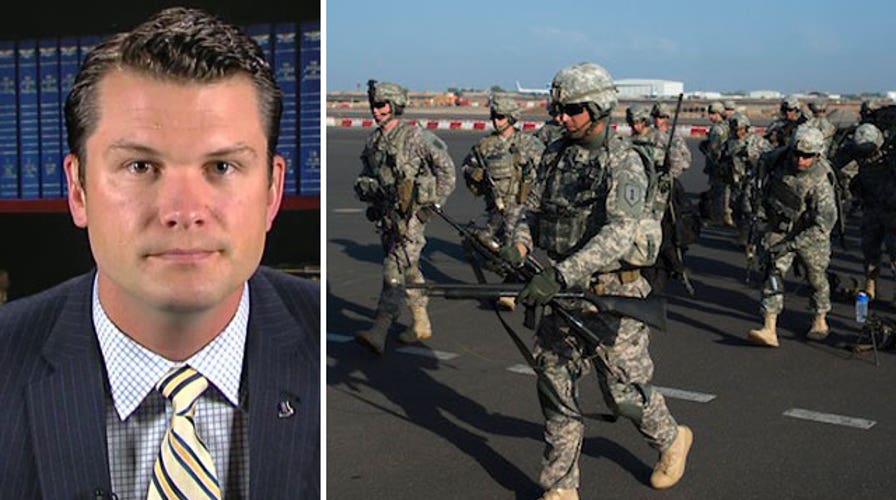Did you know that in the 2010 midterm elections, only 57% of America’s veterans voted? With so much at stake in America—and across the world—veterans left 9.3 million votes on the table. Not to mention the tens of millions of military family members—wives, husbands, mothers, and fathers—who also failed to execute their most basic civic task.
When compared to the nation average for midterm voter participation (38%), the veterans’ participation number looks good. But considering the sheer potential of the veterans population, and taken in the context of their shared understanding of the fragile nature of freedom—a 57% voter participation rate is unacceptable.
In 2014, veterans have the opportunity to change this trend—and the stakes have never been higher.
This year, after six years of the Obama administration, veterans and military families saw the direction of the country they fought for fly off the rails. From the Department of Veterans Affairs (VA) scandal, the gutting of the DoD budget, the rise of ISIS in Iraq and Syria, an ever-mounting national debt, and the trade of one American deserter for five Taliban terrorists—America’s veterans have been put through the wringer; left feeling betrayed by the nation they served.
[pullquote]
Moreover, in political race after political race, veterans watch politicians attempt to falsely tout, glaze over, or race-to-defend their supposed “pro-veteran” bona fides. Veterans have been taken for granted—and used as campaign-season props—for too long, and this year was no exception.
No longer.
It’s time for veterans and their families to take back their country, and their legacy—and it starts by going to the polls Tuesday to make their voice heard. There are just shy of 22 million veterans in America, alongside over 40 million Americans that are classified as “military family members.” If properly targeted, motivated, and organized, it’s a voting block—60+ million strong—that could chart the future of this nation.
To illustrate my point, consider North Carolina—a state where my group, Concerned Veterans for America (CVA), has been pushing to ‘Get Out The Vets’ as part of our #GOTVets initiative.
In 2010, roughly 2.7 million North Carolinians voted. Of those, about 434,000 were veterans—16% of total voters. If all 775,000 Tarheel veterans had voted, adding 341,000 voters, then veterans would have been 25% of the voting electorate. Considering the 2010 North Carolina senate race was considered by a lesser margin—and this year’s race is razor thin—these numbers really do matter.
And while it’s unlikely that every veteran will be mobilized to get to the polls, it is possible to get a good chunk of additional veterans to the polls—as well as a member of their “military family.” Veterans never serve alone, and they shouldn’t vote alone either.
Military families support our troops when they’re abroad, and should vote to support them at home as well. Properly organized, North Carolina veterans and military family members could realistically represent 1 million total voters. With one-third of the total voting block coming from veterans and their families, North Carolina politicians would ignore, exploit, or patronize veterans at their peril.
But North Carolina is just one example. The same can be said of veteran and military family populations in nearly every state in the union—including, and especially, other swing states like Ohio, Florida, and Virginia to name few.
The main excuse I hear from people as to why they don’t vote is that voting doesn’t make a difference, and that one vote can’t change a nation. On the latter point, they’re right—one vote can’t change a nation, just like one soldier can’t fight alone.
When I was in Iraq, if I went out on patrol by myself—I’m toast. But alongside the other 39 members of my light-infantry platoon, suddenly I’m part of the most fearsome fighting force the world has ever seen.
United in moral purpose, clarity and action—veterans can be the fearsome fighting force they were on the battlefield. So while one vote rarely decides a race, groups of veterans fighting united at home like they once did in battle would be a fearless force for the freedoms and prosperity we love.
The first ten months of 2014 were not good for America and her veterans, but there is no reason why November 4—armed with our ballots and shared purpose—we cannot chart the course for a freer, more prosperous, and more secure America.
Veterans and our families must ask: if not us, then who? And if not now, then when? If we don’t stand up and fight, then politicians will keep making empty promises, our freedoms will continue to erode, and our military will continue to suffer. It’s time we got up off the couch—and exercise the right that millions of Americans have fought, and died, to defend.
It’s time to vote. Vote for your children. Vote for your grandchildren. Vote to honor those who died on the battlefield so that you could. Vote, for America.

